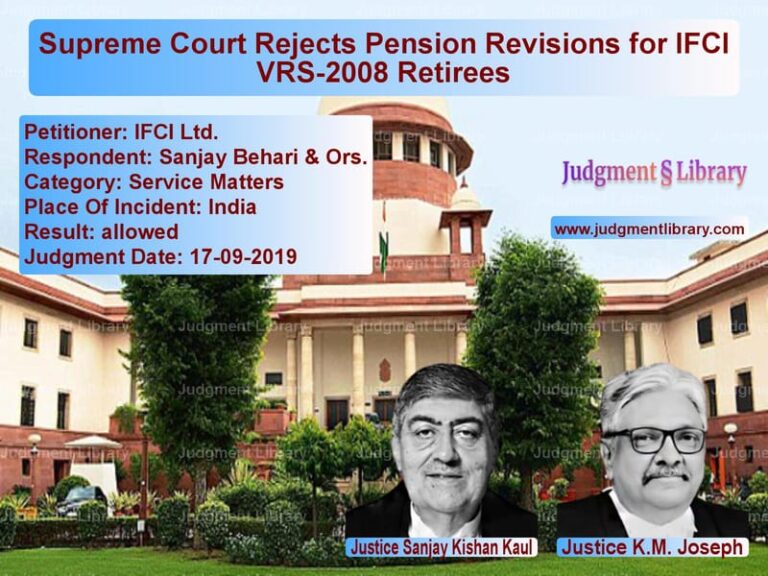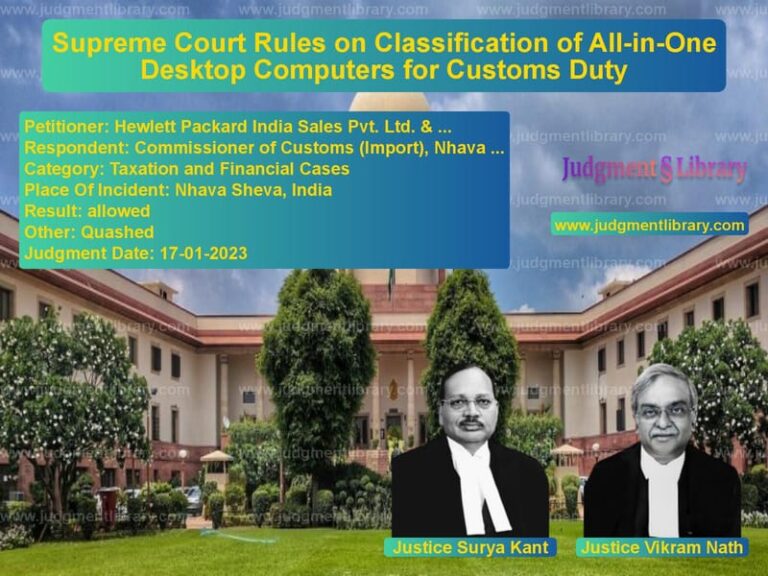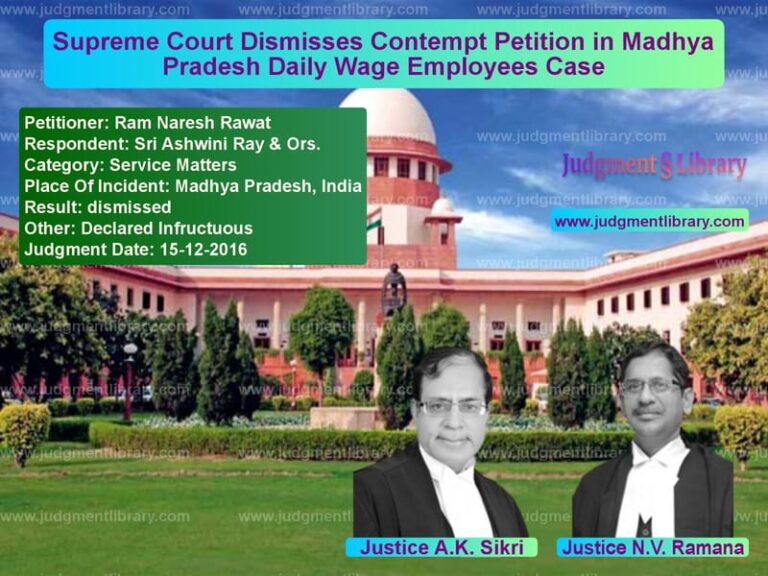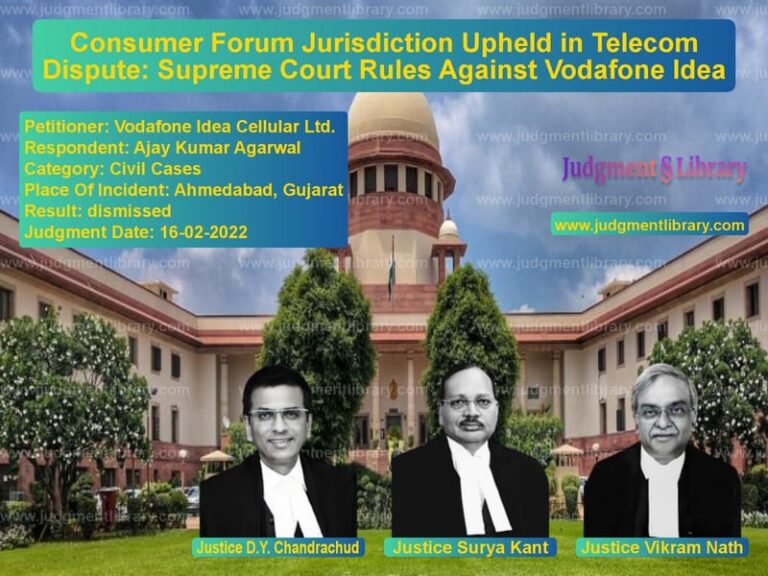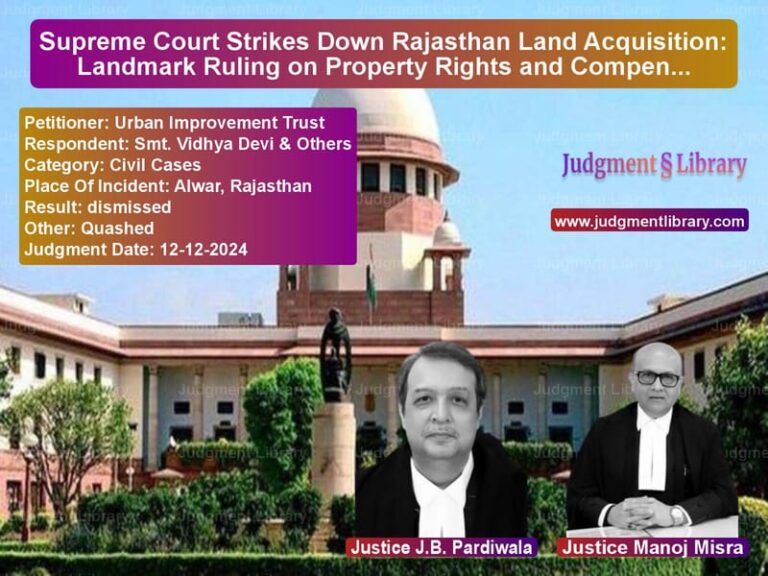Adverse Possession and Mortgage Redemption: Supreme Court’s Landmark Judgment
The case of Venugopal Padayachi (Dead) Through LRs. vs. V. Pichaikaran (Dead) Through LRs. dealt with a long-standing property dispute involving mortgage redemption and a claim of adverse possession. The Supreme Court’s ruling on September 18, 2018, provided a significant interpretation of property laws, particularly regarding when adverse possession begins and how unregistered documents affect ownership claims.
Background of the Case
The dispute originated over a property transaction involving two key documents:
- A ‘simple mortgage’ deed dated March 20, 1959, executed by the plaintiff in favor of the defendant.
- A subsequent unregistered document dated November 12, 1960, in which the plaintiff purportedly transferred ownership rights to the defendant.
Based on these transactions, the plaintiff filed Original Suit No.2249 of 1981 for redemption of the mortgage and recovery of possession.
Defendant’s Claims
The defendant, in response to the plaintiff’s suit, raised the following contentions:
- The 1959 mortgage deed was a simple mortgage, meaning possession was not transferred to the defendant at that time.
- The subsequent document dated November 12, 1960, though unregistered, should be considered for collateral purposes to establish that possession was transferred.
- Since the suit was filed more than 12 years after the alleged transfer of possession in 1960, the defendant had acquired ownership through adverse possession.
Trial Court and Lower Appellate Court Decisions
The trial court agreed with the defendant’s claims and ruled that:
- The unregistered document could not confer legal ownership but could establish possession.
- From 1960 onward, the defendant’s possession was adverse to the plaintiff.
- Since the suit was filed in 1981, more than 12 years after the defendant took possession, the defendant had perfected ownership through adverse possession.
- The suit was therefore dismissed.
The lower appellate court upheld this ruling, leading the plaintiff to file Second Appeal No.209 of 1989 before the Madras High Court.
Madras High Court’s Judgment
The High Court framed the following substantial question of law:
“Whether the Courts below are right in law in finding adverse possession when the execution of the mortgage deed is not disputed by the Defendant?”
The High Court’s key findings were:
- The mortgage deed of 1959 was a simple mortgage, meaning possession remained with the plaintiff.
- The unregistered 1960 document could not be used to transfer ownership but indicated that the defendant was put in possession.
- The High Court concluded that the defendant’s possession was not adverse because there was an “understanding” between the parties, indicating that possession was given with some form of agreement.
- As a result, the High Court ruled in favor of the plaintiff and decreed redemption of the mortgage.
Supreme Court’s Observations
The defendant, aggrieved by the High Court’s decision, filed an appeal before the Supreme Court, arguing that:
- The High Court wrongly assumed an “understanding” between the parties, which was not part of the case record.
- By 1960, possession had already been transferred to the defendant, making the possession adverse from that date.
- Both the trial court and the appellate court correctly applied the principle of adverse possession, and the High Court erred in reversing these findings.
The Supreme Court reviewed the case and made the following key observations:
- The 1960 document, though unregistered, could be used for collateral purposes to establish possession.
- Since the defendant had been in possession since 1960, and the plaintiff failed to assert ownership within the limitation period, the defendant’s possession had become adverse.
- The High Court’s conclusion that there was an “understanding” between the parties was not based on evidence and was an incorrect assumption.
- The principle of adverse possession was correctly applied by the trial court and the appellate court.
- The Supreme Court cited earlier rulings, including:
“Once the mortgagee is claiming to be an absolute owner of the property, his/her status as mortgagee comes to an end and his/her possession becomes adverse to the original owner.”
(Rukmani Ammal & Another v. Jagdesa Gounder, 2006)
Final Judgment
Based on the above findings, the Supreme Court ruled:
- The appeal was allowed, setting aside the High Court’s decision.
- The defendant was declared the lawful owner of the property due to adverse possession.
- The plaintiff’s suit for redemption was dismissed.
Implications of the Judgment
This Supreme Court ruling has significant implications for property disputes:
- Adverse Possession and Mortgagee Rights: If a mortgagee remains in possession beyond the statutory limitation period, they can claim ownership through adverse possession.
- Effect of Unregistered Documents: While an unregistered sale deed cannot transfer ownership, it can be used as collateral evidence to establish possession.
- High Court’s Role in Second Appeals: The ruling emphasizes that High Courts should not interfere with well-reasoned findings of fact by lower courts unless there is a clear legal error.
The case reaffirms that property disputes must be adjudicated based on clear legal principles, and adverse possession remains a valid legal defense in long-standing possession cases.
Petitioner Name: Venugopal Padayachi (Dead) Through LRs..Respondent Name: V. Pichaikaran (Dead) Through LRs..Judgment By: Justice Uday Umesh Lalit, Justice Sanjay Kishan Kaul.Place Of Incident: Madras.Judgment Date: 18-09-2018.
Don’t miss out on the full details! Download the complete judgment in PDF format below and gain valuable insights instantly!
Download Judgment: Venugopal Padayachi vs V. Pichaikaran (Dead Supreme Court of India Judgment Dated 18-09-2018.pdf
Direct Downlaod Judgment: Direct downlaod this Judgment
See all petitions in Property Disputes
See all petitions in Landlord-Tenant Disputes
See all petitions in Succession and Wills
See all petitions in Judgment by Uday Umesh Lalit
See all petitions in Judgment by Sanjay Kishan Kaul
See all petitions in allowed
See all petitions in Quashed
See all petitions in supreme court of India judgments September 2018
See all petitions in 2018 judgments
See all posts in Civil Cases Category
See all allowed petitions in Civil Cases Category
See all Dismissed petitions in Civil Cases Category
See all partially allowed petitions in Civil Cases Category


